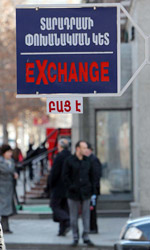It turns out that the reasons of the 8.8% economic growth of this year are everything but the bad economic rates of last year. During the 16th session of the Armenian competition foundation Tigran Sargsyan came up with an opening speech and said that the economic growth of 8,8% is a result of three factors.
According to the PM, the first factor is the recovering tendencies of the world economy, which supports the sectors of the Armenian economy to recover as well. “Agriculture grew by 1%, and the construction sector by 12%. The unemployment rate is cutting down and there is a tendency of salary increase, especially in the private and state sectors,” writes the statement.
“The PM says that the second factor is the anti-crisis policy as a result of the government’s enlargement efforts, which were targeted at the creation of a comfortable environment for small and medium businesses, specifically law amendments, reduction of tax reporting and increasing tax privileges, adoption of the institute of fixed taxes and simplified tax system. He also said that another important factor is the road construction, drinking and agricultural water pipes construction works done due to foreign borrowings.”
According to him, the third factor is the balance of the currency exchange rate as a result of the monetary policy implemented by the Central Bank, which had a positive influence on prices.
It is a very interesting approach. Let’s start from the currency exchange rates. We were wandering why the national currency was appreciating, and now it turns out that it was done by the Central Bank. We are calling it appreciation of dram, and the PM says it is stabilization of currency, but the process is the same and it is the same thing. Even more, the PM gave the answer why it is done. It is done for the purpose of reducing the prices. Certainly we have problems with prices and we are in the second place among the CIS countries with inflation rate. Moldova is in the first place. The government does not implement a real policy to cope with the crisis such as a policy of fighting against oligopolies and monopolies, but is relying on the easiest method of the national currency appreciation. This means that the appreciation of the dram will result in the reduction of import prices. Do you remember the alternative our government was suggesting by asking to make a choice between the currency exchange rates and inflation? Now it is repeating. Either we will have to get used to the increase of the national currency even if it impacts the domestic producers, or we will have to not complain that the prices are growing rapidly. But no one is asking us and they have chosen the currency exchange rates. “We are entering the deflation phase and during the coming two months we will have deflation and annually 5-6% will be realistic,” said Tigran Sargsyan. Judging by his words, the national currency will continue growing.
By the way, there are signs already showing this tendency. Yesterday at NASDAQ OEMEX ARMENIA CJSC 7.550.000USD was traded at the average rate of 367.97 dram for one dollar. The closing rate was 368 dram. Banks were buying dollar for 365-366 dram and selling for 369-370 dram.
The PM has also spoken of the unemployment reduction during the period of January-May (when the economic growth reached 8.8%) but the official statistics reports that the unemployment rate grew by 1.2%.
When speaking of growth in different sectors of the economy he proudly emphasized the growth of 12% in the construction sector. However, this time he did not speak of diversification of the economy, reduction of the construction sector growth ratio in the GDP and other lessons learnt from the crisis. Judging from all this, we see that we are going through the same path as it made our economy look like it is now.
The prime-minister posts all his speeches in his blog and expects to hear feedback and discussions. “If you follow my activities, you will see that I always answer to the discussions and recommendations in my blog. I am happy to see that a community of smart people has been formed in my blog, I can even call it a volunteer group of advisers, and I am grateful to them for their opinions,” once wrote the PM when commenting on the development of relations with Europe and European institutions.
The PM has not posted his speech at the National Foundation for Competition in his blog. But a visitor of the blog said concerning the above that it was about volunteer advisers and their ole in state policy and economic policy as well. “Mr. prime-minister, don’t blow the minds of people by saying that a group of smart people has been formed in your blog and you are grateful to them because it is not a secret that you real advisers are the beneficiaries of the IMF and World Bank, who are sitting in our country and saying what is happening in the financial market like they would forecast the weather and giving direct instructions what to do.” We are not the one who says this but the people for whom this blog was opened (to communicate without the media).

